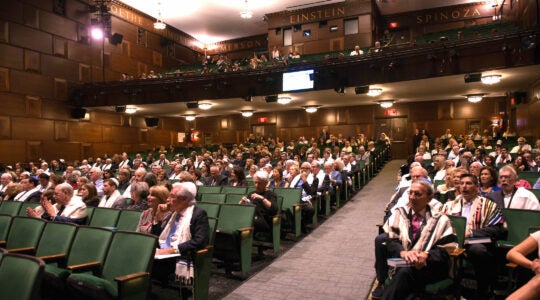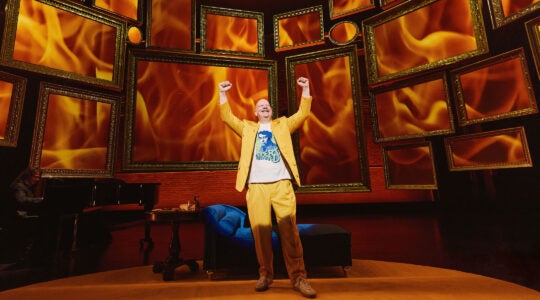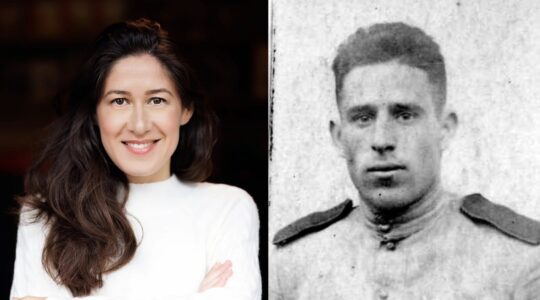The first time I saw Fyvush Finkel was on TV. He played a racist, belligerent history teacher on “Boston Public.” That image couldn’t have stood in starker contrast to the man I would later meet, someone who was warm and respectful to everyone he encountered. Fyvush Finkel, the Emmy Award-winning actor and Yiddish theater star who died here Sunday at 93, was hilarious, heimisch and one of a kind.
He began his acting career on the Yiddish stage when he was 9, in 1931, though he would accompany the famous cantors of the time in his synagogue choir even before he started in the theater. He got his first big “break” from Peysakhke Burshteyn, an acting gig Finkel was forever grateful for. The Yiddish stars of the 1950s were reluctant to share the stage with “young blood,” and so they played parts written for younger actors even when they themselves were aging. In this way, they blocked new actors from the stage and failed to attract new patrons to the theater.
What made Finkel unique, though, was his ability to straddle both worlds — those of his Yiddish roots and the broader mainstream culture. He maintained tremendous respect and reverence for the older generations, including his contemporaries, my grandparents, who worked so hard for the preservation of Yiddish culture, but he was actively immersed on the secular stage as well.
https://www.youtube.com/watch?v=ir4ESzKDBQ4
The first thing I remember about meeting Finkel in person was his smile, almost cartoon- and caricature-esque, with his eyes nearly bulging out of his face; that smile brought you in immediately. It didn’t matter if it was a joke or part of his gag, his demeanor let you know here was a tenderhearted person.
After hearing about Finkel’s passing, I reached out to Corey Breier, the current president of the Yiddish Theatrical Alliance and a family friend. Breier has been a bit of a “gabbai” and adopted caregiver for so many of the Yiddish greats who once were.
“I’m running out,” he said to me. “They’re all gone. Fyvush was the last.”
He emphasized Finkel’s menschlikeit, adding that the actor knew everyone. When Breier and Finkel would visit Mt. Hebron in Queens, the burial plot of the Yiddish Theatrical Alliance, Finkel would point out everyone’s name: theater owners, costume designers, actors. He could tell you how they were on stage and off as well.
“I played with them all,” Finkel would often say.
Finkel came from a traditional home, and while not religious he could lead davening, and did so. Breier added how Finkel had just emceed a show Breier on June 20 in the same synagogue where his funeral was to take place this week, the Sutton Place Synagogue. “Monticello, Here We Come,” a revue recalling the Catskills and Borsht Belt would turn out to be Finkel’s last gig in New York City.
But he was not finished. He had three bookings after Breier’s and was going to make a stage appearance at the National Yiddish Theatre Folksbiene’s production of “The Golden Bride” this week. That type of indomitable, creative spirit, where a person is eager to share, that insatiable thirst for life is what made Finkel so special.
Breier said that Finkel had that spirit back in the old days, too. He would spend his whole day working as an activities director in a Catskills hotel, and then hustle around the different clubs at night, with up to three gigs. That image stands in stark contrast to the one of Finkel in a hospital bed, where he spent so much of his last year.
When I got married, in 2010, we held a post-wedding celebration, sheva brachot, at my aunt and uncle’s home in New York City. Adrienne Cooper, the great singer and teacher, recited a blessing, as did Finkel. That felt like a special treat, as I never performed with Finkel on stage. And yet, that was part of Finkel’s big-heartedness. He would show up for shul, celebrations and family affairs, as well as Broadway galas and television award shows.
When addressing a crowd at the Yiddish theater, Finkel would famously quip, “I’m 89 or 90,” or however old he was, and then pause and add, “But with this crowd, it’s no big deal.” When someone lives so long, you expect they will be around forever. May his memory be a blessing, and may his humor bring us joy.
Rabbi Avram Mlotek is co-founder of BASE Hillel. A native Yiddish speaker, he has been performing on the Yiddish stage since he was a child.
See Fyvush Finkel obituary at thejewishweek.com, on the Well Versed arts blog.
The New York Jewish Week brings you the stories behind the headlines, keeping you connected to Jewish life in New York. Help sustain the reporting you trust by donating today.




